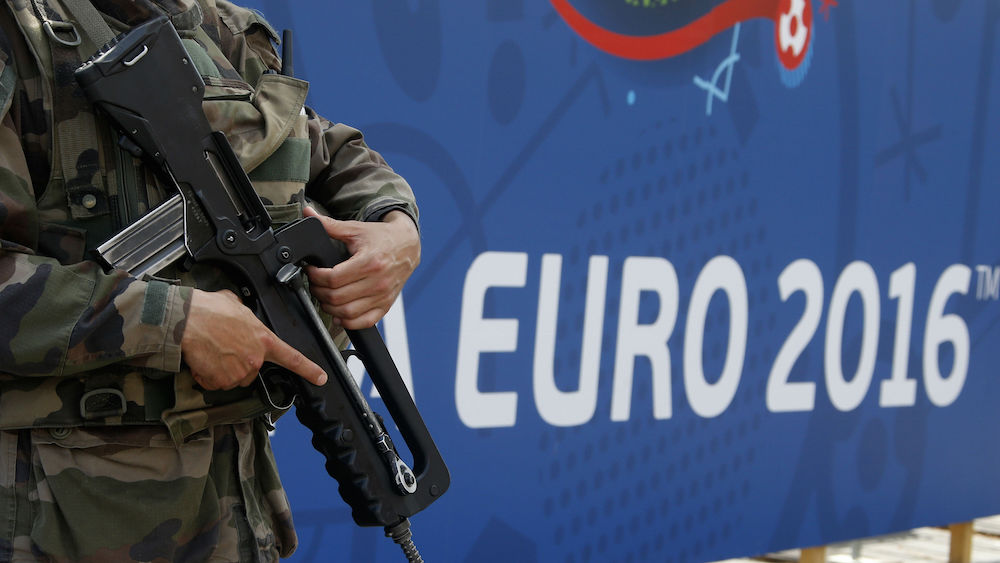As with any continent-spanning tournaments, the EURO 2016 Championship is a bellwether of Europe’s geo-political status and zeitgeist. But it also gives hope in troubled times.
Tonight, France and Romania will kick off the 2016 UEFA European Championship at Stade de France in Paris. A new emotional roller coaster will begin for millions of Europeans hoping to eat, drink, and breath soccer – or football, as non-Americans call it – for four weeks. Football grouches will have a hard time escaping discussions about the tournament’s title favorites and the likely line-up of the next match, as well as the condition of Cristiano Ronaldo’s six-pack and Zlatan Ibrahimović’s latest tweets.
Still, it is difficult to imagine that Europeans will be able to fully enjoy this distraction from the crisis mode that has overwhelmed the EU and its member states for the past six years. The next couple of weeks will be too tricky and challenging politically to allow enough breathing space for both policy makers and citizens to simply enjoy “the beautiful game.”
First, Britain’s decision on June 23 to leave or stay in the EU will significantly impact how the EU will look in the future – no matter the outcome of the referendum. Second, only three days later on June 26, Spain’s choice to either get behind the protest vote or reconnect with the parties that ruled the country since the demise of the fascist Franco dictatorship in 1975 could lead to even more discord between member states. Finally, the EU’s refugee crisis will not end unless member states agree to a lasting solution based on European solidarity – despite the disputable EU-Turkey agreement.
Since the first tournament in 1960, the European Championship has become a stock-taking exercise on the continent’s ever-changing (geo)political status and zeitgeist. The EURO 2016 will be no different, reflecting the dramatic changes Europe underwent since the last tournament four years ago in Poland and Ukraine. Back then, Spain’s road to their second consecutive championship led them twice to Donbass Stadium in Donetsk; less than two years later, Donetsk had turned into a theater of war with Ukrainian armed forces and pro-Russian separatists clashing for control of the town and region.
While both Ukraine and Russia will participate in this year’s tournament, Russia’s annexation of the Crimea seems irreversible, most of Eastern Ukraine is frozen in conflict, and the EU and Russia have sanctioned each other. Football is not spared from this upheaval: Ukraine initially did not select players currently signed by Russian clubs, leading to heated debates about alleged politically motivated nominations. Both teams might meet in round 16, which could provoke a politically explosive situation.
Traumatized Hosts
Security will be the most visible aspect for football fans heading to France. France is still traumatized by the terror attacks in November 2015, when suicide bombers targeted a friendly match between France and Germany at Stade de France. Authorities are worried about the European Championship being a potential target for terrorists. European football fans will feel slightly queasy while chanting their songs in the French streets and simultaneously being watched by security forces and guarded by armed soldiers. They will face tight security restrictions at fan festivals, in and outside of the stadiums, and in airports, train stations, and metro stops, testing their patience to the limit. But this is Europe in 2016: a continent in constant fear of the next terrorist attack.
Contemporary Europe’s most worrisome feature, which will be present at this year’s EURO, is the return of identity politics and the debate over a multicultural Europe stirred by right-winged parties across the continent. Football itself has always had a tremendous integrative power. When the glorious Équipe Tricolore, the French national team, won the World Cup at home in 1998, players like Zinedine Zidane, Patrick Vieira, Lilian Thuram, and Christian Karembeu embodied the ethnic diversity of France. Their achievement was praised as an example of the modern multicultural French ideal and the success of the “French model” of social integration.
However, this national celebration of diversity was short-lived. Four years after their victory, the far-right National Front presidential candidate Jean-Marie Le Pen finished second in the national elections. (His daughter Marine Le Pen will try to better papa in 2017.) And last year’s terrorist attacks have once again sparked a dangerous integration debate in France, which risks making a simplistic connection between feelings of insecurity and issues of ethnicity, religion, and inequality.
In Germany, the anti-immigration party Alternative für Deutschland (AfD) has tried to exploit the discontent with Chancellor Angela Merkel’s refugee policies. One AfD leader criticized the diverse ethnic backgrounds of the German players and argued that the Mannschaft “is no longer German.” And “Germans,” AfD deputy chair Alexander Gauland claimed, would not like to have someone like star-player Jérôme Boateng – who was born in Berlin to a Ghanaian father and a German mother – as a neighbor. Other AfD members criticized German midfielder Mesut Özil, a third-generation Turkish-German, for posting a selfie on Facebook from his pilgrimage to Mecca, calling it an “anti-patriotic signal.”
These examples highlight how toxic and explosive the debate surrounding integration and migration has become in Europe, and how easily football – a mirror of society – can be hijacked by right-wing demagogues. But even in times of serious division, Europe has always managed to reconnect through football – perhaps most famously on Christmas in 1914 during World War I, when British and German soldiers climbed out of their trenches for a match in no-man’s land. A hundred years on, the continent’s favorite pastime still succeeds in bringing together people from all nationalities and backgrounds – some hope in troubled times.
NB. A longer version of this article first appeared on the Reconnecting Europe blog, published by the Heinrich Böll Foundation European Union.







